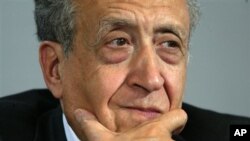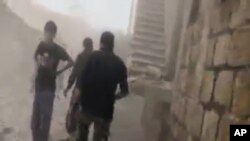French Foreign Minister Laurent Fabius says Western powers would have a "massive" response to any use of chemical or biological weapons by Syrian President Bashar al-Assad's forces.
Fabius said in broadcast interviews Monday there is broad agreement about such a response, calling chemical weapons "a very big danger."
His comments come as the head of the International Red Cross travels to Syria for a three-day visit that will include meetings with Assad and other officials. The group says the talks will focus on the "rapidly deteriorating humanitarian situation" in Syria and the challenges in reaching those impacted by the conflict.
Meanwhile, the new United Nations-Arab League envoy tasked with bringing a peaceful solution to the Syrian crisis says he has "no illusions" that his job will be easy.
Algerian diplomat Lakhdar Brahimi said in an interview broadcast Monday by the BBC that he does not yet see any ways around the barriers that blocked the efforts of his predecessor, Kofi Annan, but that he will continue trying.
Brahimi says he realizes the difficulty of his task, and that success "should be possible."
Annan quit last month, complaining that he could not fulfill his mission due to international divisions on Syria and escalating attacks by both Syrian government and rebel forces.
Brahimi says the lack of international action as people in Syria continue dying "is a terrible weight."
Opposition activists are reporting more deaths Monday, saying a bombing by a Syrian warplane has killed at least 15 people in the northern town of Al-Bab.
Some information for this report was provided by AP, AFP and Reuters
Fabius said in broadcast interviews Monday there is broad agreement about such a response, calling chemical weapons "a very big danger."
His comments come as the head of the International Red Cross travels to Syria for a three-day visit that will include meetings with Assad and other officials. The group says the talks will focus on the "rapidly deteriorating humanitarian situation" in Syria and the challenges in reaching those impacted by the conflict.
Meanwhile, the new United Nations-Arab League envoy tasked with bringing a peaceful solution to the Syrian crisis says he has "no illusions" that his job will be easy.
Algerian diplomat Lakhdar Brahimi said in an interview broadcast Monday by the BBC that he does not yet see any ways around the barriers that blocked the efforts of his predecessor, Kofi Annan, but that he will continue trying.
Brahimi says he realizes the difficulty of his task, and that success "should be possible."
Annan quit last month, complaining that he could not fulfill his mission due to international divisions on Syria and escalating attacks by both Syrian government and rebel forces.
Brahimi says the lack of international action as people in Syria continue dying "is a terrible weight."
Opposition activists are reporting more deaths Monday, saying a bombing by a Syrian warplane has killed at least 15 people in the northern town of Al-Bab.
Some information for this report was provided by AP, AFP and Reuters







